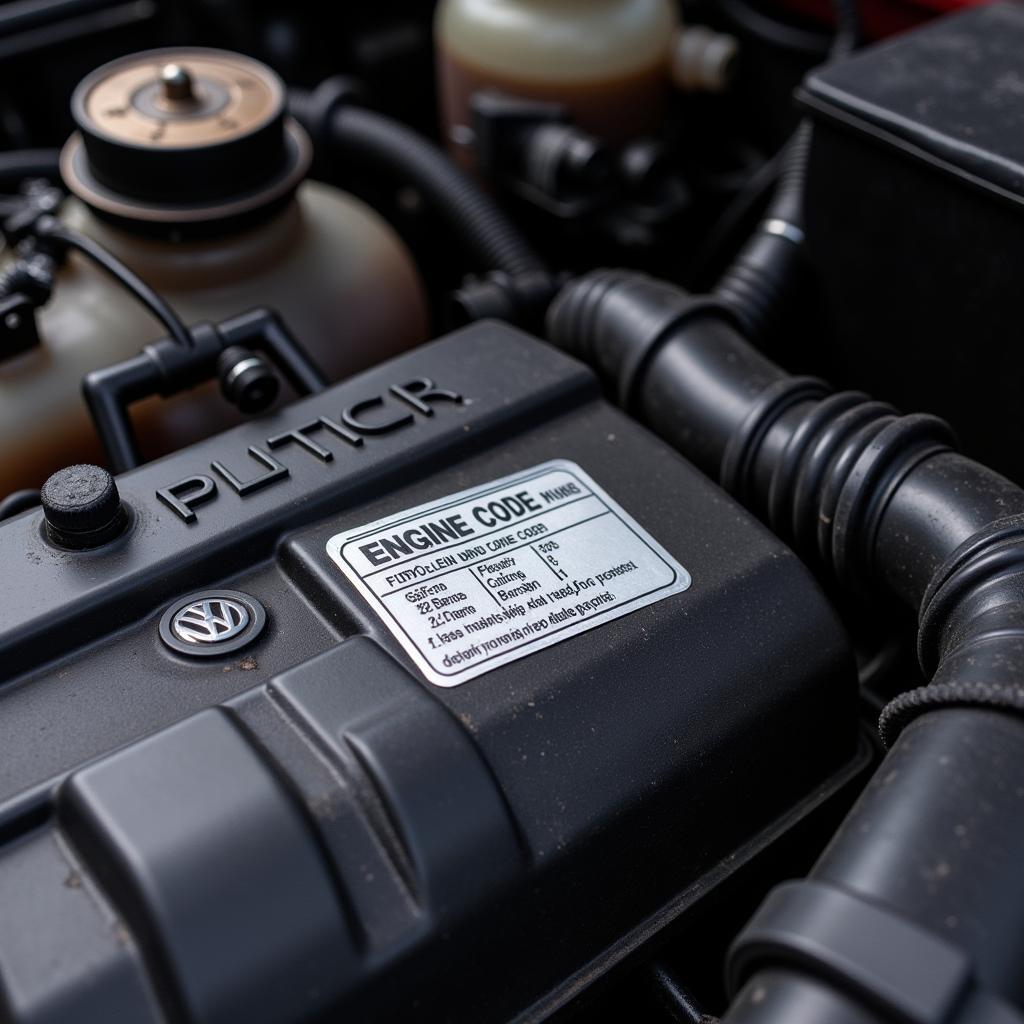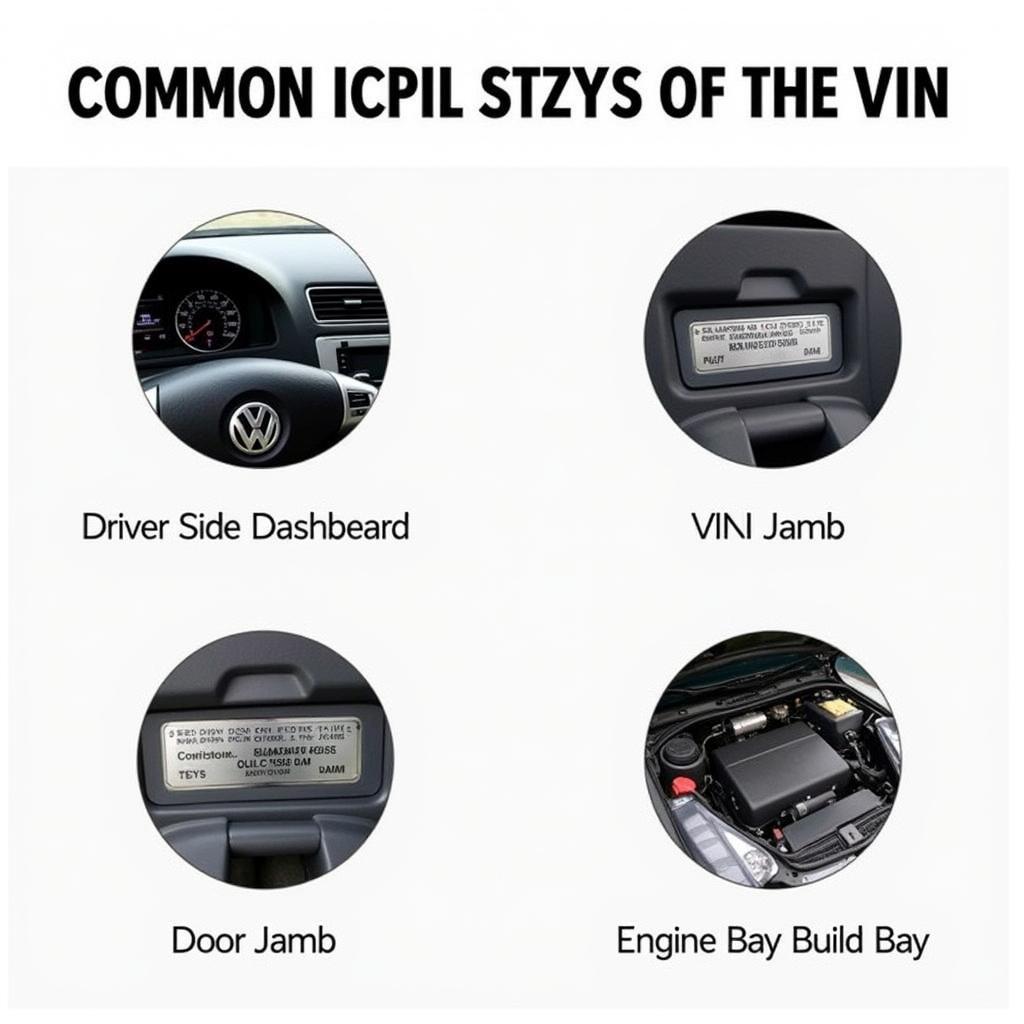Your cart is currently empty!

Understanding VW Build Codes: A Comprehensive Guide
Volkswagen, renowned for its precision engineering, equips its vehicles with unique build codes that act as a vehicle’s DNA. These codes, often overlooked, provide a wealth of information about your VW, ranging from engine specifications and transmission type to factory-installed options and regional specifications. Understanding these codes is crucial, whether you’re a seasoned technician or a VW enthusiast, as they can streamline diagnostics, repairs, and even help you source the right parts.
Imagine this: your VW displays an unfamiliar warning light. Armed with the knowledge of your car’s build codes, you can quickly pinpoint the affected system, saving time and potential headaches. This comprehensive guide delves deep into the world of VW build codes, equipping you with the knowledge to decipher this cryptic language and leverage it to your advantage.
Decoding the Enigma: What are VW Build Codes?
Think of VW build codes as a personalized birth certificate for your car. These alphanumeric codes, embedded within the vehicle identification number (VIN) and various vehicle stickers, hold the key to unlocking a treasure trove of information. They reveal:
- Engine and Transmission: Uncover the exact specifications of your engine and transmission, including displacement, fuel type, and horsepower.
- Factory-Fitted Options: Determine the factory-installed options your VW came equipped with, like sunroof, navigation system, or heated seats.
- Manufacturing Location and Date: Trace your VW’s journey from the factory floor, identifying where and when it was manufactured.
- Regional Specifications: Understand how your VW was tailored to meet specific regional regulations and market demands.
 VW Engine Bay
VW Engine Bay
Unveiling the Secrets: Where to Find VW Build Codes
Unearthing your VW’s build codes is like embarking on a scavenger hunt, with clues scattered throughout your vehicle. Here are the key locations to investigate:
- Vehicle Identification Number (VIN): This 17-character code, often found on the driver’s side dashboard and door jamb, contains specific characters that indicate engine and model year information.
- Sticker Under the Spare Tire/Trunk Floor: Lift the carpet in your trunk or spare tire well to reveal a sticker that often lists the build codes.
- Service Booklet: Your VW’s service booklet may contain a dedicated section listing the build codes or a sticker with the information.
- Online Resources: Utilize online VIN decoders and VW enthusiast forums to retrieve build code information using your VIN.
 VW VIN Location
VW VIN Location
The Power of Knowing: Benefits of Understanding VW Build Codes
Possessing the knowledge of your VW’s build codes empowers you with a deeper understanding of your vehicle and simplifies various aspects of ownership:
- Accurate Diagnostics: Pinpoint the root cause of issues swiftly by identifying the specific components and systems present in your car.
- Efficient Repairs: Ensure the correct parts are ordered and repairs are targeted, minimizing downtime and unnecessary expenses.
- Informed Modifications: Confidently pursue performance upgrades or modifications, knowing the compatibility with your specific VW model.
- Historical Preservation: Maintain the authenticity of your classic VW by referencing the build codes during restoration projects.
- Increased Resale Value: Provide potential buyers with detailed vehicle information, enhancing transparency and potentially commanding a higher resale price.
“As a technician specializing in VWs, understanding build codes is non-negotiable,” says Michael Schmidt, a seasoned VW mechanic with over 20 years of experience. “It’s like having a direct line to the factory, ensuring I’m always working with the right information.”
Beyond the Basics: Deciphering Common VW Build Codes
Let’s unravel some commonly encountered VW build codes:
- Engine Codes: A combination of letters and numbers, like “CBFA” or “CCTA”, representing specific engine variants. For instance, you might encounter issues with the vw p0234 fault code, which pertains to the turbocharger/supercharger system. Knowing your engine code helps you pinpoint the issue accurately.
- Transmission Codes: Codes like “GSR” or “JHM” that identify the type of transmission equipped in your VW, crucial for transmission-related repairs or replacements.
- Paint Codes: Alphanumeric codes found on a sticker in the spare tire well or service booklet, specifying the exact shade of your VW’s paint for accurate touch-ups or repainting.
Troubleshooting with Build Codes: A Real-World Scenario
Imagine your VW Beetle throws a p0507 code vw beetle, indicating an issue with the idle control system. Knowing your engine code helps you determine the specific idle control valve used in your model, facilitating targeted repairs.
Similarly, if you encounter a vw p0322 fault code related to the crankshaft position sensor, referencing your build codes helps you source the correct replacement sensor compatible with your engine and transmission combination.
Furthermore, understanding your VW’s build codes becomes invaluable when dealing with complex electronic modules, such as those responsible for engine management, transmission control, or airbag systems. These modules are often model-specific, and using the wrong module can lead to compatibility issues and malfunctioning systems.
VW Build Codes: Your Key to Informed Ownership
In conclusion, VW build codes are more than just a random assortment of letters and numbers. They are the key to unlocking a deeper understanding of your VW, empowering you to make informed decisions regarding maintenance, repairs, and modifications.
By embracing the power of these codes, you transform yourself from a passive owner into an informed enthusiast, equipped to navigate the world of VW ownership with confidence. Remember, knowledge is power, and understanding your VW’s build codes puts you firmly in the driver’s seat.
Need assistance deciphering your VW’s build codes or tackling a tricky repair? Reach out to the experts at VCDSTool at +1 (641) 206-8880 and our email address: vcdstool@gmail.com or visit our office at 6719 W 70th Ave, Arvada, CO 80003, USA. We’re here to help you keep your VW running smoothly.
by
Tags:
Leave a Reply